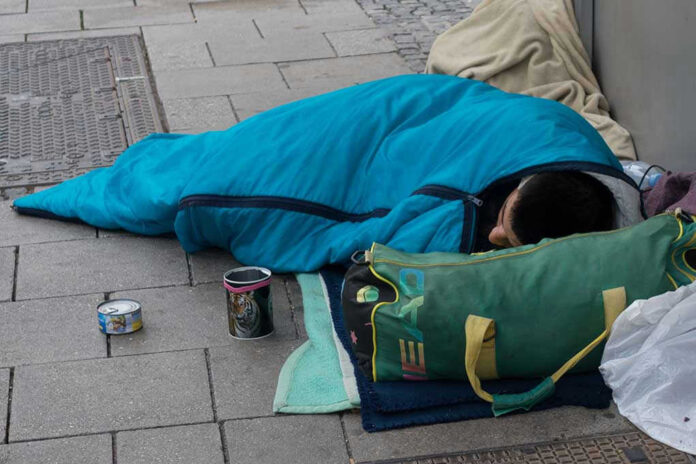
President Trump openly endorses reopening “insane asylums” to institutionalize mentally ill individuals currently living on America’s streets, marking a dramatic reversal of decades-long deinstitutionalization policies that left our cities overrun with homeless encampments.
Story Overview
- Trump signs an executive order expanding involuntary commitments for mental illness and substance abuse disorders.
- Over 1,300 arrests have been made and 50 homeless encampments have been cleared in Washington, D.C. since August.
- The President deploys the National Guard and federal law enforcement to combat the urban homelessness crisis.
- Mental health advocates claim policy will “warehouse people” instead of providing proper treatment.
Trump’s Bold Solution to Failed Liberal Policies
President Trump signed a groundbreaking executive order in July 2025 that expanded involuntary commitments for individuals suffering from mental illness and substance use disorders. The administration’s approach directly addresses what many Americans have witnessed firsthand: the complete failure of progressive policies that allowed our cities to become open-air drug markets and homeless camps. Trump’s willingness to consider reopening large-scale psychiatric institutions represents a common-sense return to solutions that prioritize public safety and actually help those who cannot help themselves.
The president’s statements align perfectly with the frustrations of law-abiding Americans who have watched liberal policies destroy urban centers. For decades, the so-called “compassionate” approach of allowing severely mentally ill individuals to live on the streets has resulted in nothing but human suffering and community decay. Trump’s approach acknowledges that genuine compassion sometimes necessitates difficult decisions that balance both public safety and genuine care for those who lack the capacity to make rational choices about their own welfare.
Immediate Results Speak Volumes
The effectiveness of Trump’s decisive action became immediately apparent in Washington, D.C., where federal law enforcement and National Guard units cleared over 50 homeless encampments and made more than 1,300 arrests since August 7, 2025. These results demonstrate what happens when leadership prioritizes public safety over politically correct posturing. The White House reported these statistics on August 29, 2025, showing that swift, decisive action produces tangible improvements in urban conditions that liberal policies failed to address for years.
This stands in stark contrast to the Biden administration’s approach, which essentially ignored the growing crisis while taxpayer dollars disappeared into ineffective programs that enabled rather than solved homelessness. The previous administration’s policies treated the symptoms while ignoring the underlying reality that many individuals living on the streets suffer from severe mental illness requiring institutional care, not just housing vouchers and social services.
Predictable Opposition from the Same Failed Voices
Critics of Trump’s policy, including Paolo del Vecchio, a former SAMHSA executive officer, claim the president’s actions “set us back decades to the days of warehousing people in back hospital wards.” This criticism reveals the fundamental disconnect between ivory tower theorists and the reality facing American communities. Del Vecchio and similar voices prefer the current system where mentally ill individuals “warehouse” themselves in tents under highway overpasses, subjecting themselves and surrounding communities to dangerous and unsanitary conditions.
The same experts who oversaw decades of policy failures now oppose solutions that actually work. A Government Accountability Office report suggests involuntary outpatient treatments may not be as effective as supporters claim, but this misses the point entirely. The current approach of leaving severely mentally ill individuals on the streets with no intervention has proven catastrophically ineffective, creating public health crises, crime waves, and human tragedy on an unprecedented scale.
Constitutional Authority and Necessary Action
Trump’s executive order redirects federal funding to support expanded involuntary commitment efforts while requiring state and local governments to comply with new standards. This represents appropriate use of federal authority to address a crisis that liberal state and local governments have either ignored or actively enabled through permissive policies. The administration’s approach respects constitutional principles while ensuring that federal taxpayer dollars support effective solutions rather than programs that perpetuate the problem.
The policy recognizes that individuals suffering from severe mental illness often lack the capacity to make rational decisions about treatment and housing. Allowing such individuals to remain on the streets in the name of “civil liberties” actually denies them the medical care they desperately need while imposing tremendous costs on law-abiding citizens who must navigate around encampments, endure public health hazards, and watch their communities deteriorate. True compassion requires intervention, not abandonment disguised as respect for autonomy.
Sources:
The Independent – Trump Mental Asylums Homeless
STAT News – Mental Illness Trump Executive Order Involuntary Commitments
Prison Policy Initiative – Unhoused Executive Order



















